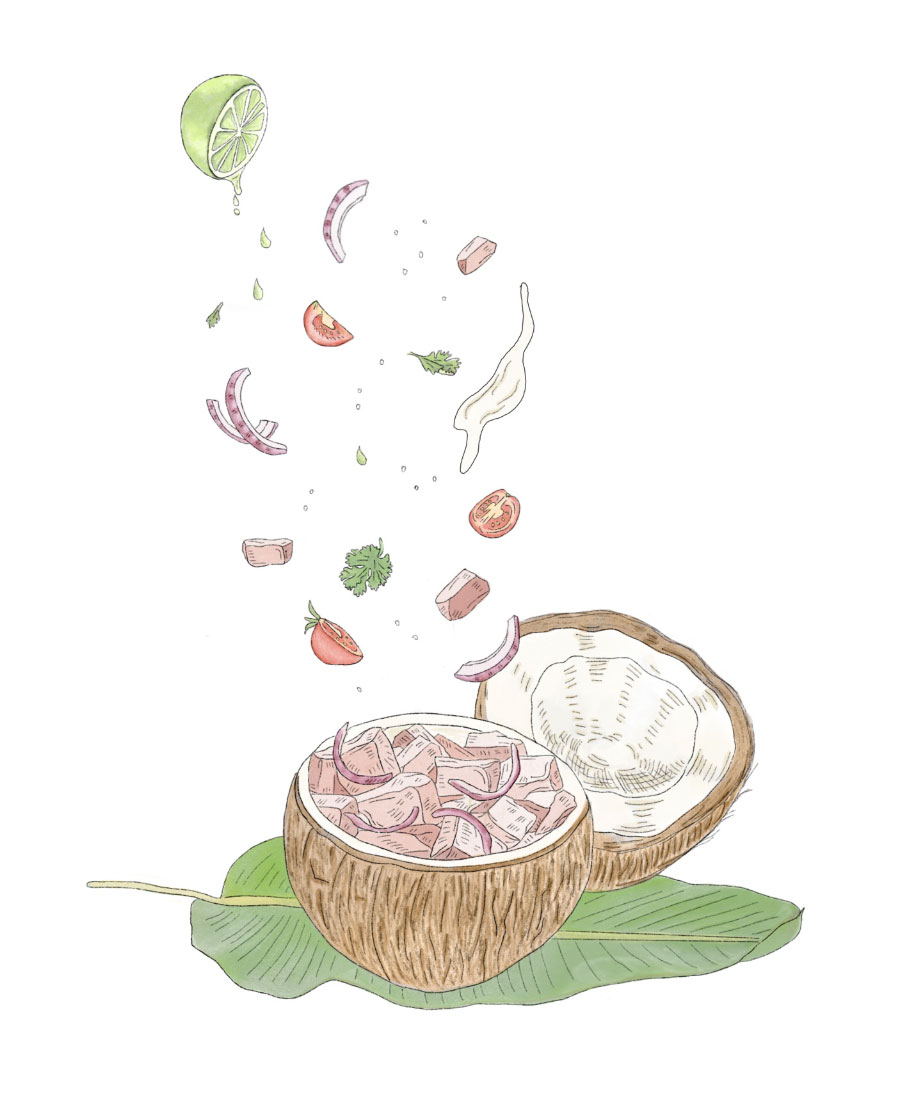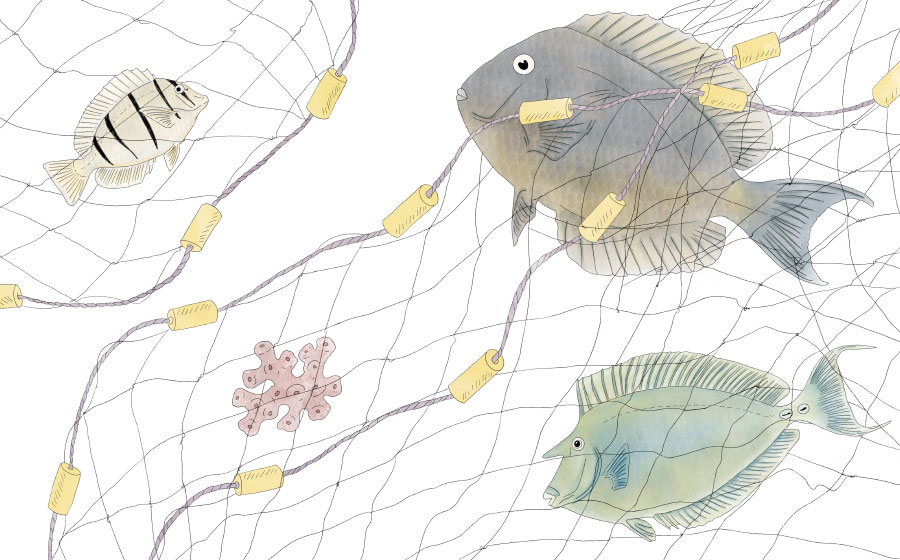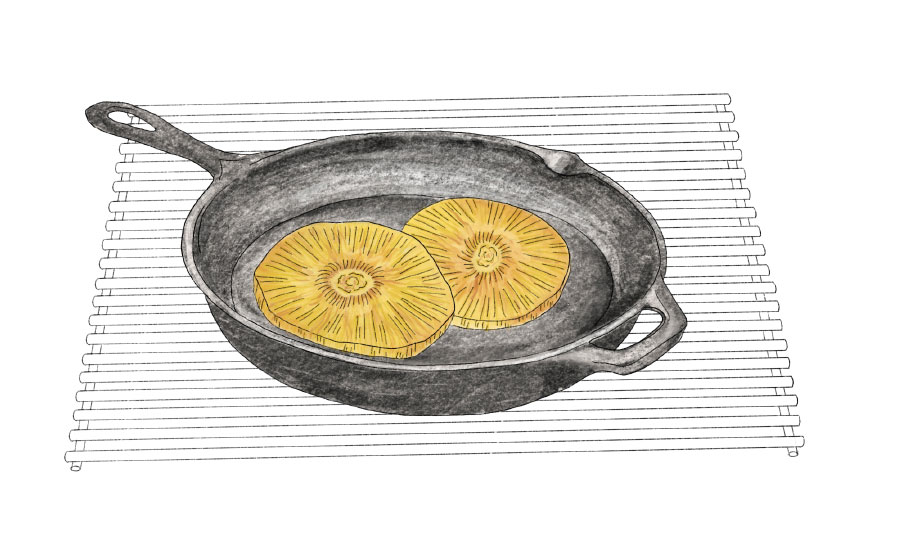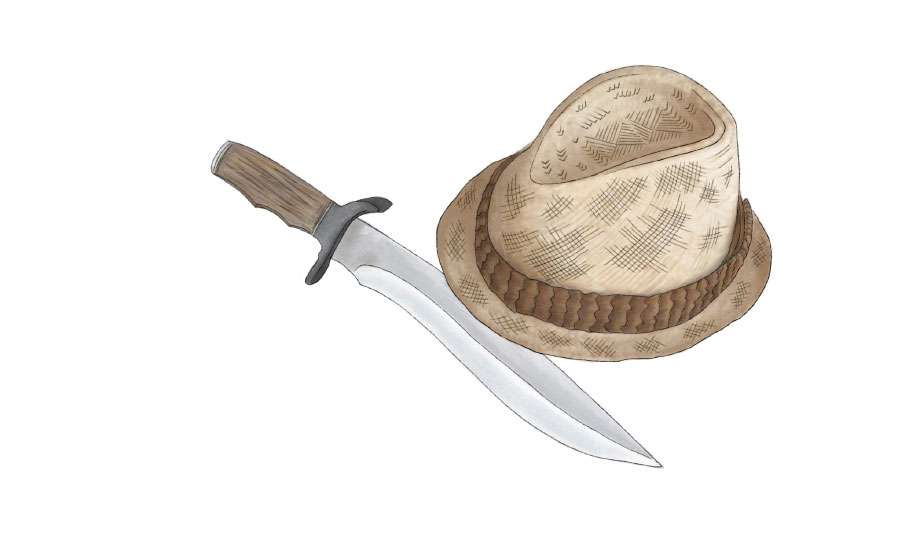At Mākua, a group of friends join master forager Lāʻau Castro in savoring the bounties of land and sea.
“Eeeee-oooo!” A voice calls out from an approaching truck. Nahalelā‘au Castro pulls up and parks with flourish amid the patches of grass across Mākua Cave. An elbow slung out the window, Lāʻau tips his pāpale in greeting, a wide grin on his face and a beer in hand. It’s 9:30 in the morning. Lāʻau always knows how to make an entrance.

As Lāʻau unloads baskets and boxes from the truck bed, I make a quick round of introductions. My friends Lauren, John, and Taylor, and my boyfriend, Jun, have come to spend a day fishing with us out West Side. “Mel and Abel are joining too,” Lāʻau says as he passes out more boxes. He unlocks a large crate in the truck. Out springs Lucky, his pet goat. She immediately eyeballs our crew with suspicion. It’s clear the horned creature loves her master and loathes the rest of us. “She doesn’t like women,” Lāʻau says, looking sheepishly toward Lauren and me. It’s part apology and part warning. We take heed. Lucky’s horns look too sharp to question otherwise.
The man and his goat companion make a comical pair leading us down to the shoreline: Lāʻau’s shirtless, sinewy frame moving fluidly through the kiawe underbrush, Lucky getting underfoot every other moment.
As we hump our provisions along a thin, dusty trail, Lāʻau regales us with his latest escapades and scolds Lucky for her chronic impudence. Soon, we emerge onto an empty stretch of beach. Behind us, the Waiʻanae Mountain range rises like steep cathedral walls. Before us shimmers a vast expanse of sea and sky. We fall quiet in a moment of shared communion and wonder.

For Lāʻau, building his best life has meant stripping it down. By the time he reached 40, he had dabbled—and excelled—in a variety of professions: a fine-dining line cook and a deckhand, a commercial diver and tugboat driver. A stint in the corporate world filled his bank account but didn’t quite fulfill who he knew himself to be. Lāʻau preferred being outdoors with the forest, sea, and sky. This connection to nature was a leitmotif in his Native Hawaiian lineage. His grandmother, Konaluhiole Mahaulu Gabriel, practiced traditional Hawaiian medicinal ways. Her own mother had been a revered kahuna lā‘au lapa‘au. In feeding others through foraging, fishing, and hunting, Lāʻau realized that he could honor his family’s legacy in his own way.
As we relax in the shade of a shallow cave, Mel and Abel arrive, and we discuss our strategy for laying the net. Earlier that morning, Mel and Lāʻau had tried their luck at Nānākuli, but the effort had yielded nothing. Instead, the net was found twisted and tangled as if on a spindle —a sign of an enterprising monk seal taking advantage of an easy, fast meal. But Lāʻau says he has a good feeling about Mākua. He had learned to fish here as a kid with his uncle. The day feels auspicious.
The noon sun scorches our backs as we look to the ocean, a tantalizing refuge only 50 meters away. We wobble forward, picking a path across the reef ’s minefield of sharp, uneven crags and treacherous, black-needled wana. Lāʻau pauses and deftly shucks a hā‘uke‘uke, the purple, flat-spined urchin, from a rock. Hā‘uke‘uke is less disastrous to step on and, Lāʻau adds, far more delicious. Cracking it open, he scoops out the creamy, orange innards to share, a mid-journey snack.
Once we make it to the ocean, the men jump in, moving in concert with the current to lay the net. On shore, Lauren and I watch an entertaining and near-ludicrous scene: Lucky pacing back and forth, distraught at her inability to accompany her master into the water, bleating plaintively from the reef ’s edge; Lāʻau bleating back in reassurance.

The bleating stops as the men begin to splash and bellow at the water’s surface paepae style, frightening the fish to scatter toward the net. Suddenly the bellows turn to cheers. Glorious triumph!
Back on shore, the fish glisten and flick about in the tangled net. We inventory the catch: Manini. Pualu. Kala. I scrutinize the horned kala. Growing up, I considered kala a throwaway fish— its tough skin and meat notorious for its malodorous stench and unpleasant seaweed taste. Lāʻau dismisses the notion. “No fish is rubbish fish,” he says. “You just gotta know how to cook it.” Something catches Lāʻau’s attention. “Ho! We get one oʻahu!” We clamor for a glimpse of what must certainly be a prized fish, although none of us recognize the name. “An oʻahu,” he intones, gesturing to a fist-sized clump of coral knotted in the line. We roll our eyes and laugh at our gullibility.
Back in the cave, Lāʻau sets to work in preparing a meal, the twin forces of passion and purpose on full display. He lays out an impressive spread: Lilikoi-glazed pork from a wild boar hunted in Papakōlea. Blackened kala seasoned with garlic salt. Hearty ‘ulu slices charred in the cast-iron pan. Poisson cru, its flavor bright with freshly squeezed lime. We feast as if kings and queens.

Soon it’s time to go home. None of us want this summer day to end. Back at our vehicles, I learn that it hasn’t, at least not yet. Some people—tough and unapproachable looking—have parked their cars not far from ours. Within minutes, Lāʻau is infiltrating their ranks with his charm. He offers them ‘ulu, and insists they take some fish too. His merriment is contagious, and soon our groups join together. Someone produces an ‘ukulele, launching our little party into a fullblown kanikapila. We all eat and sing together as new friends in the golden late afternoon sun.
I look at Lāʻau, a wide grin on his face and a cold beer in hand. I’m reminded of our conversation about his grandmother. “Tūtū’s way was to welcome everyone. She shared her time with them, cooking and feeding them,” La‘au had explained. “That’s what I like to do too.”
